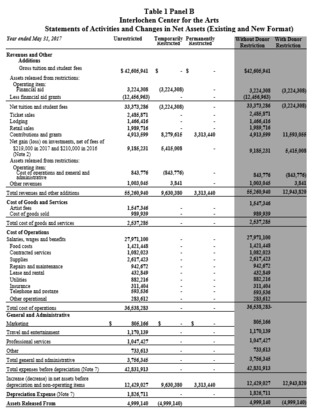eCFR :: 2 CFR Part 200 Subpart E Cost Principles

(i) Except as specified for teaching activity in paragraph (h)(5)(ii) of this section, charges for work performed by faculty members on Federal awards during periods not included in the base salary period will be at a rate not in excess of the IBS. Intra-IHE consulting by faculty should be undertaken as an IHE responsibility requiring no compensation in addition to IBS. (2) The allowable compensation for certain employees is subject to a ceiling in accordance with statute. For the amount of the ceiling for cost-reimbursement contracts, the covered compensation subject to the ceiling, the covered employees, and other relevant provisions, see 10 U.S.C. 2324(e)(1)(P), and 41 U.S.C. 1127 and 4304(a)(16).

The most notable principles include the revenue recognition principle, matching principle, materiality principle, and consistency principle. Completeness is ensured by the materiality principle, as all material transactions should be accounted for in the financial statements. This makes it easier for investors to analyze and extract useful information from the company’s financial statements, including trend data over a period of time.
Subpart E—Cost Principles
(2) Any costs of auditing a non-Federal entity that is exempted from having an audit conducted under the Single Audit Act and subpart F of this part because its expenditures under Federal awards are less than $750,000 during the non-Federal entity’s fiscal year. (c) The term “public relations” includes community relations and means those activities dedicated to maintaining the image of the non-Federal entity or maintaining or promoting understanding and favorable relations with the community or public at large or any segment of the public. (3) The Federal awarding agency must implement, and make publicly available, the policies, procedures and general decision-making criteria that their programs will follow to seek and justify deviations from negotiated rates. (3) Is necessary to the overall operation of the non-Federal entity and is assignable in part to the Federal award in accordance with the principles in this subpart. (e) Whether the non-Federal entity significantly deviates from its established practices and policies regarding the incurrence of costs, which may unjustifiably increase the Federal award’s cost.
The Federal cognizant agency for indirect costs may agree to an extension of the six-month period if an appropriate adjustment is made to compensate for the timing of the charges to the Federal Government and related Federal reimbursements and the non-Federal entity’s contributions to the PRHP fund. Adjustments may be made by cash refund, reduction in current year’s PRHP costs, or other equitable procedures to compensate the Federal Government for the time value of Federal reimbursements in excess of contributions to the PRHP fund. (ii) Pension costs calculated using an actuarial cost-based method recognized by GAAP are allowable for a given fiscal year if they are funded for that year within six months after the end of that year.
Examples of Cost Accounting
The basic accounting principle is that all the cost principle accounting information needs to be based on a cash or cash-equivalent principle. The higher standard of “earned” for eliminating E-liabilities (relative to “realizable” for recognizing E-assets) is based on the economic significance of netting. Just as revenue recognition increases a firm’s income, raising shareholders’ expectation for dividends, reducing a company’s E-liabilities communicates to customers, shareholders, and regulators that the firm’s products (its inputs and operations) generated less carbon than those of its peers did. New customer sales and new investments can be made based on such claimed efficiencies.
Accounting for Carbon Offsets – HBR.org Daily
Accounting for Carbon Offsets.
Posted: Mon, 12 Jun 2023 16:10:54 GMT [source]
These principles are designed to provide consistency and set standards throughout the financial reporting field. Financial and cost accounting systems can be differentiated based on their target audiences. Financial accounting is designed to help those who don’t have access to inside business information, such as shareholders, lenders, and regulators. For example, retail investors who analyze financial statements benefit from a company’s financial accounting.
Five Principles of a Functioning Offset Marketplace
Costs of insurance with respect to any costs incurred to correct defects in the non-Federal entity’s materials or workmanship are unallowable. (2) Costs of insurance or of contributions to any reserve covering the risk of loss of, or damage to, Federal Government property are unallowable except to the extent that the Federal awarding agency has specifically required or approved such costs. (1) Donated personal property and use of space may be furnished to a non-Federal entity. The value of the personal property and space may not be charged to the Federal award either as a direct or indirect cost. That portion of automobile costs furnished by the non-Federal entity that relates to personal use by employees (including transportation to and from work) is unallowable as fringe benefit or indirect (F&A) costs regardless of whether the cost is reported as taxable income to the employees. (i) When a non-Federal entity uses the cash basis of accounting, the cost of leave is recognized in the period that the leave is taken and paid for.

(b) Costs of bonding required pursuant to the terms and conditions of the Federal award are allowable. (3) Costs of conducting general liaison with news media and government public relations officers, to the extent that such activities are limited to communication and liaison necessary to keep the public informed on matters of public concern, such as notices of funding opportunities, financial change in net working capital matters, etc. (4) Program outreach and other specific purposes necessary to meet the requirements of the Federal award. (e) If the contract is subject to CAS, costs must be allocated to the contract pursuant to the Cost Accounting Standards. To the extent that CAS is applicable, the allocation of costs in accordance with CAS takes precedence over the allocation provisions in this part.
